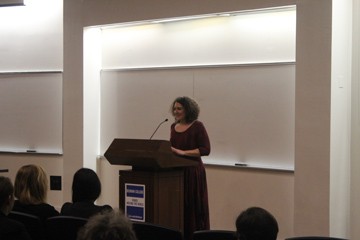
Shelby Knox was born and raised in Lubbock, Texas — where, in an interview with The Washington Post, Knox told the reporter “there’s nothing to do in Lubbock except have sex.”
And sex, in fact, has been much of the foundation of her crusade in the feminist movement fighting for women’s reproductive rights. Well-known from the documentary, “The Education of Shelby Knox,” the critically-acclaimed film chronicled Knox fighting for comprehensive sex education in the state she said isn’t “solving the problems Texans are really concerned about.”
“Every year, the legislature says their top priority is rolling back reproductive rights,” Knox said. “They spend a lot of time, they spend a lot of…tax payer money, and in doing so, they endanger Texas women.”
In the state with the highest rate of uninsured persons, Knox said Texas has “an education system that is failing” and running out of money — but still, “Texas seems to be at the forefront of rolling back” reproductive rights.
With the new abortion ban set to go into effect this week, the state is now firing back after a federal judge ruled Monday parts of the bill to be unconstitutional with respect to women’s rights.
Texas Attorney General Greg Abbott filed an appeal of the judge’s decision Tuesday with the 5th Circuit Court of Appeals in New Orleans.
It’s the back-and-forth antics that Knox believes are halting much of the possible progress for the greater good.
“We’re just having this fight of whether women should be equal in the eyes of Texas state law,” Knox said. “We’re spending this money as a state to try to fight a national political battle, and that’s not fair to Texans.”
As much as the Texas political climate is seemingly dominated by conservative views, Knox explained that the growing movement of women’s rights is taking a firm hold — and not just within state lines.
“The Stand with Texas Women was some of the most exciting, inspiring organization I’ve seen in a long time,” Knox noted, referencing Wendy Davis’ now-famous 13-hour filibuster to block the abortion bill this past summer.
With support gaining substantial momentum both in-state and across the country, Knox said that feminists across Texas said, “We’re going to make this a national issue,” and saw tangible success.
“If you only focus in on the rollbacks, then yes, that’s all your going to see,” Knox said. “But if you focus in on the quality of the organizing, on the quality of the people coming here to Texas…[these] are indicators [of coming change].”








